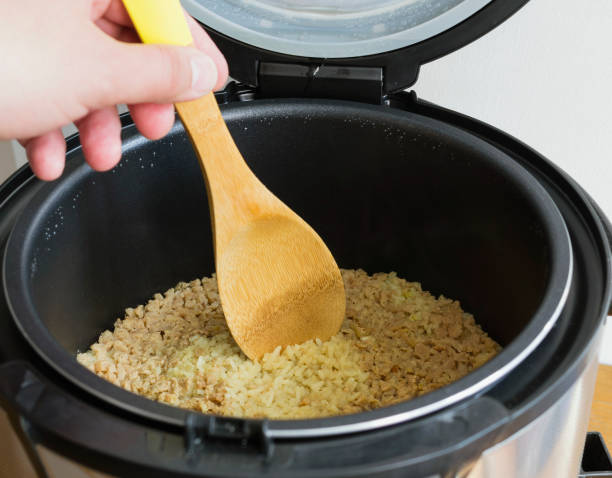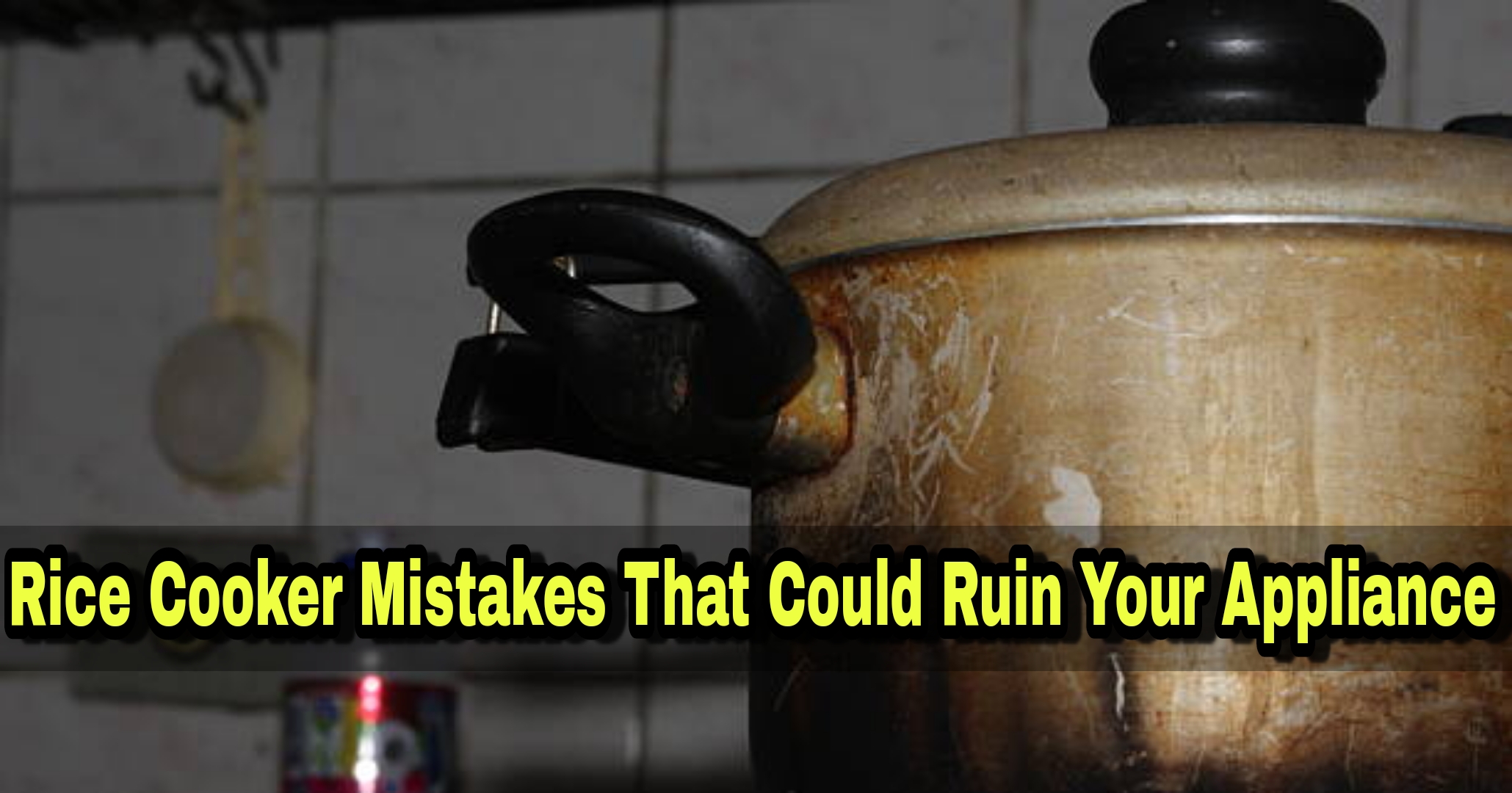The Hidden Risks of Improper Rice Cooker Mistakes
Rice cookers are essential kitchen appliances in many households, particularly in Asian countries like South Korea. However, many users unknowingly damage their rice cookers through common misconceptions and improper handling techniques.

The Dangers of Washing Rice Directly in the Inner Pot
Most people believe washing rice directly in the rice cooker’s inner pot is harmless and convenient. This misconception can lead to significant damage to your appliance. Manufacturers carefully design inner pots with a protective coating that ensures safe and efficient cooking. When you wash rice directly in the pot, you risk:
– Scratching the protective surface layer
– Compromising the non-stick properties
– Reducing the cooker’s overall performance and lifespan
Recommended Washing Technique
1. Use a separate colander or bowl for rinsing
2. Thoroughly wash rice until water runs clear
3. Gently transfer clean rice to the inner pot
4. Add appropriate water amount
5. Cook as usual
Electrical Safety Concerns
Socket Management
Many users overlook the importance of proper electrical setup. Plugging your rice cooker into the same socket as high-power devices like microwaves or refrigerators can:
– Cause electrical overload
– Increase short-circuit risks
– Potentially trigger electrical fires
Best Practices
– Use a dedicated electrical socket for your rice cooker
– Avoid multiple high-power appliances on the same circuit
– Regularly inspect electrical connections
Moisture and Electrical Components
Preventing Moisture Damage
A common mistake is placing a wet inner pot directly into the rice cooker. This can:
– Introduce moisture to heating elements
– Create potential electrical leakage
– Compromise the cooker’s internal mechanism
Safety Steps
– Completely dry the inner pot before use
– Use a clean, dry cloth to wipe down surfaces
– Allow pot to air dry if necessary
Proper Pot Placement Technique
The Two-Hand Method
Many people casually place the inner pot using just one hand. This seemingly minor action can cause significant issues:
– Uneven contact with the cooking relay
– Inconsistent heating
– Potential damage to internal components
Correct Placement Procedure
1. Use both hands to hold the inner pot
2. Gently lower the pot into the cooker
3. Rotate slightly to ensure even contact
4. Confirm proper alignment before cooking
Long-Term Maintenance Tips
Preserving Your Rice Cooker
– Clean after each use
– Inspect seals and gaskets regularly
– Store in a cool, dry place
– Follow manufacturer’s maintenance guidelines
Conclusion
Understanding and implementing proper rice cooker usage can significantly extend your appliance’s lifespan. By avoiding common mistakes like washing rice directly in the pot, managing electrical connections, and using careful handling techniques, you can ensure consistent, high-quality rice preparation.

Remember, a well-maintained rice cooker is not just an appliance—it’s an investment in delicious, perfectly cooked meals.


Howdy very nice site!! Guy .. Excellent .. Superb .. I’ll bookmark your blog and take the feeds additionally…I am satisfied to seek out numerous helpful information here in the post, we want work out more techniques on this regard, thank you for sharing.
Great ?V I should definitely pronounce, impressed with your web site. I had no trouble navigating through all tabs as well as related information ended up being truly simple to do to access. I recently found what I hoped for before you know it in the least. Quite unusual. Is likely to appreciate it for those who add forums or anything, website theme . a tones way for your customer to communicate. Excellent task..
Nice blog here! Also your web site loads up fast! What host are you using? Can I get your affiliate link to your host? I wish my site loaded up as fast as yours lol
I wish to express some appreciation to the writer for bailing me out of such a issue. As a result of browsing through the search engines and finding solutions that were not helpful, I thought my entire life was well over. Living devoid of the strategies to the difficulties you have solved by means of the blog post is a serious case, and those which might have in a negative way damaged my career if I hadn’t discovered the blog. Your own personal expertise and kindness in maneuvering all the things was excellent. I’m not sure what I would have done if I hadn’t come upon such a step like this. It’s possible to now look forward to my future. Thanks very much for your skilled and effective guide. I will not be reluctant to suggest your blog post to any person who should get direction about this issue.
I like this weblog very much so much superb information.
Reading your article helped me a lot and I agree with you. But I still have some doubts, can you clarify for me? I’ll keep an eye out for your answers. https://accounts.binance.info/pl/register-person?ref=UM6SMJM3
Thank you for some other excellent post. Where else may just anybody get that kind of information in such an ideal method of writing? I’ve a presentation subsequent week, and I’m at the search for such information.
купить квартиру жк светский лес цены
стоимость химчистки обуви отдать обувь в химчистку
проектор цена интернет-магазин проекторов в Москве
Любишь азарт? t.me играть онлайн в популярные игры и режимы. Быстрый вход, удобная регистрация, стабильная работа платформы, понятный интерфейс и комфортные условия для игры в любое время на компьютере и мобильных устройствах.
Любишь азарт? up x казино играть онлайн легко и удобно. Быстрый доступ к аккаунту, понятная навигация, корректная работа на любых устройствах и комфортный формат для пользователей.
Can you be more specific about the content of your article? After reading it, I still have some doubts. Hope you can help me. https://accounts.binance.info/register-person?ref=IHJUI7TF
флисовый костюм мужской мужские костюмы спб
Электромонтажные работы https://electric-top.ru в Москве и области. Круглосуточный выезд электриков. Гарантия на работу. Аварийный электрик.
коррозия у авто? антикоррозийная обработка спб эффективная защита от влаги, соли и реагентов. Комплексная обработка кузова и днища, качественные составы и надёжный результат для новых и подержанных авто.
Коррозия на авто? Авто Тех Центр «Защита» мы используем передовые шведские материалы Mercasol и Noxudol для качественной защиты днища и скрытых полостей кузова. На все работы предоставляется гарантия сроком 8 лет, а цены остаются доступными благодаря прямым поставкам материалов от производителя.
Планируете мероприятие? организация корпоратива с ии уникальные интерактивные форматы с нейросетями для бизнеса. Мы разрабатываем корпоративные мероприятия под ключ — будь то тимбилдинги, обучающие мастер?классы или иные активности с ИИ, — с учётом ваших целей. Работаем в Москве, Санкт?Петербурге и регионах. AI?Event специализируется на организации корпоративных мероприятий с применением технологий искусственного интеллекта.
Противопожарные двери https://bastion52.ru купить для защиты помещений от огня и дыма. Большой выбор моделей, классы огнестойкости EI30, EI60, EI90, качественная фурнитура и соответствие действующим стандартам.
Нужны цветы? цветы воронеж закажите цветы с доставкой на дом или в офис. Большой выбор букетов, свежие цветы, стильное оформление и точная доставка. Подойдёт для праздников, сюрпризов и важных событий.
Любишь азарт? kometa casino официальный сайт современные слоты, live-форматы, понятные правила и удобный доступ с ПК и смартфонов. Играйте онлайн в удобное время.
Играешь в казино? ап икс сайт Слоты, рулетка, покер и live-дилеры, простой интерфейс, стабильная работа сайта и возможность играть онлайн без сложных настроек.
Играешь в казино? ап х Слоты, рулетка, покер и live-дилеры, простой интерфейс, стабильная работа сайта и возможность играть онлайн без сложных настроек.
Experience thrill Eye of Medusa free spins are just a click away for players looking to immerse themselves in the world of online casinos filled with a variety of games and opportunities. Whether you prefer classic slots or live dealer experiences there’s something for everyone to enjoy while playing from the comfort of home.
Русские подарки и сувениры купить в широком ассортименте. Классические и современные изделия, национальные символы, качественные материалы и оригинальные идеи для памятных и душевных подарков.
Нужно казино? апх современные игры, простой вход, понятный интерфейс и стабильная работа платформы. Играйте с компьютера и мобильных устройств в любое время без лишних сложностей.
Самые качественные блины для олимпийской штанги широкий выбор весов и форматов. Надёжные материалы, удобная посадка на гриф, долговечное покрытие. Подходят для фитнеса, пауэрлифтинга и регулярных тренировок.
A sports portal sbs sport with breaking news, statistics, and expert commentary. Match schedules, transfers, interviews, and competition results are available in real time.
Live match sporx.com.az results, the latest sports news, transfers, and today’s TV schedule. Live updates, key events, and all sports information in one portal.
Live streams https://golvar.com.az and live matches online, including the latest football schedule for today. Follow games in real time, find out dates, start times, and key events of football tournaments.
Нужна курсовая? заказать курсовую работу Подготовка работ по заданию, методическим указаниям и теме преподавателя. Сроки, правки и сопровождение до сдачи включены.
Авиабилеты по низким ценам https://tutvot.com посуточная аренда квартир, вакансии без опыта работы и займы онлайн. Актуальные предложения, простой поиск и удобный выбор решений для путешествий, работы и финансов.
заклепка вытяжная шт заклепка вытяжная нержавеющая купить
Получите актуальную ссылка на маркетплейс кракен здесь с ежедневными обновлениями
I don’t think the title of your article matches the content lol. Just kidding, mainly because I had some doubts after reading the article.
По квартирі https://cleaninglviv.top/ актуально
ДВС и КПП https://vavtomotor.ru автозапчасти для автомобилей с гарантией и проверенным состоянием. В наличии двигатели и коробки передач для популярных марок, подбор по VIN, быстрая доставка и выгодные цены.
Read the Extended Version: https://neon.today/analyze/url/yourfreepoll.com
дизайн двухэтажного коттеджа дизайн коттеджа
дизайн ванны в квартире дизайн двухкомнатной квартиры